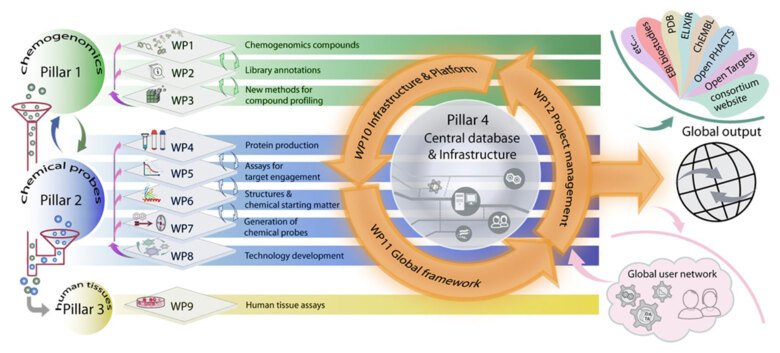Vår forskning
SGC Karolinska-laboratoriet fokuserar på tre vetenskapliga områden i) cellbaserade analyser av patient-deriverade cellsystem ii) utveckling av rekombinanta antikroppar mot selekterade målproteiner från SGC-nätverket och samarbetspartners samt iii) validering av kemogenomiska substanser mot specifika proteiner och proteinfamiljer. Vi har ett särskilt intresse av att studera inflammation och autoimmuna sjukdomar baserade på inflammatoriska processer inklusive inflammatorisk tarmsjukdom, neuro-inflammation och leverfibros.
SGC Karolinska-laboratoriet, under ledning av prof. Michael Sundström, tillhör institutionen för medicin, Solna vid Karolinska Institutet (KI), och är beläget vid Centrum för Molekylär Medicin (CMM).
SGC Karolinska-laboratoriet fokuserar på translationell medicinsk forskning inom kroniska inflammatoriska sjukdomar, neurodegenerativa sjukdomar och leverfibros för att möjliggöra framtida läkemedelsutveckling. Vi är en del av Structural Genomics Consortium (SGC), ett offentlig-privat partnerskap som stödjer upptäckten av nya läkemedel genom en öppen vetenskapsmodell. Vår forskning fokuserar på tre vetenskapliga områden i) cellbaserade analyser av patient-deriverade cellsystem ii) utveckling av rekombinanta antikroppar mot selekterade målproteiner samt iii) validering av kemogenomiska substanser mot specifika proteiner och proteinfamiljer såsom GPCR’er och jonkanaler.
Vi har ett särskilt intresse av att studera inflammation och autoimmuna sjukdomar baserat på inflammatoriska processer inklusive inflammatorisk tarmsjukdom, neuro-inflammation och leverfibros. Vi har forskningsverksamhet inom bioteknik, protein- och antikroppsproduktion, cellodling, patientderiverade cellbaserade analyser och screening samt inom ramen för EUbOPEN projektet även verksamhet inom kemogenomik och keminformatik i samarbete med Evert Homan (institutionen för onkologi och patologi, KI). All forskning bedrivs genom så kallad öppen vetenskap där alla forskningsdata och resultat omedelbart görs öppet tillgängliga för forskarsamhället.
EUbOPEN – Enabling and Unlocking Biology in the Open
EUbOPEN är ett konsortium som beviljats nästan 66 miljoner euro (690 miljoner kronor) av europeiska Innovative Medicines Initiative (IMI) och dess samarbetspartners. Medlen ska användas till att utveckla, testa och tillgängliggöra kemiska substanser och andra forskningsverktyg som kan bana väg för nya läkemedel och behandlingar av sjukdomar inom bland annat inflammation och cancer.
Projektet, som döpts till ”Enabling and Unlocking biology in the OPEN” (EUbOPEN), involverar 22 partners från akademin och industrin som tillsammans ska ta fram och validera högkvalitativa läkemedelslika kemiska substanser och andra forskningsverktyg som till exempel antikroppar. Michael Sundström, forskningschef SGC Karolinska, leder verksamheten tillsammans med andra forskare på Karolinska Institutet.
Konsortiet kommer även att testa och analysera substanserna i sjukdomsrelevanta modeller av mänsklig vävnad inom områdena immunologi, onkologi och neurovetenskap. Resultat, kemiska substanser, antikroppar, analysprotokoll och tillhörande forskningsdata görs öppet tillgängliga för forskarsamhället utan begränsningar på EUbOPEN:s webbplats.

Projektets finansiering kommer dels från IMI, och dels från läkemedelsindustrins europeiska samarbetsorganisation EFPIA, IMI-associerade partners och andra internationella partners. IMI är ett samarbete mellan EU och den europeiska läkemedelsindustrin, vars syfte är att påskynda utvecklingen av och tillgången till nya innovativa läkemedel inom områden där behoven är särskilt stora.
